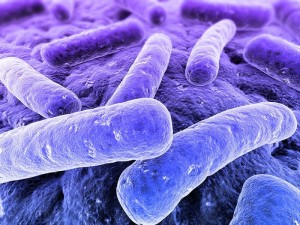 A new study tied the type of food that a person eats, with the type of bacteria found in their gut. Researchers from Perelman School of Medicine at the University of Pennsylvania recruited 98 healthy volunteers to study dietary patterns and the types of bacteria found in the gut. They used diet inventories – which are surveys of food consumption in the last 24 hours – as well as information about usual dietary habits. They compared the diet inventories to sequenced DNA from stool samples, which allowed the researchers to count and identify gut bacteria.
A new study tied the type of food that a person eats, with the type of bacteria found in their gut. Researchers from Perelman School of Medicine at the University of Pennsylvania recruited 98 healthy volunteers to study dietary patterns and the types of bacteria found in the gut. They used diet inventories – which are surveys of food consumption in the last 24 hours – as well as information about usual dietary habits. They compared the diet inventories to sequenced DNA from stool samples, which allowed the researchers to count and identify gut bacteria.
The bacteria was bunched in two broad groups called enterotypes. These two groups are distinguished mainly by levels of Bacteroides and Prevotella. Both Prevotella and Bacteroides are broad types of bacteria species that are often found in the human gut. The researchers found that enterotypes were strongly associated with diet. This was especially true for protein and animal fat (Bacteroides) versus carbohydrates (Prevotella). People tend mostly have primarily a species from one bacterial group – not both. In this study, vegetarians, as well as the one vegan in the group, were more likely to be in the Prevotella group, which is the enterotype associated with diets high in carbohydrates and lacking in meat.
Next, the researchers conducted a 10-day controlled feeding study on 10 people who had primarily Bacteroides (from a diet high in protein and animal fat) in their guts. They found that while the composition of gut microbiome did change within just a day of starting a diet higher in carbohydrates and lower in protein and fat, their gut bacteria stayed within the same broad Bacteroides group. The researchers explain that this finding emphasizes the short-term stability of the enterotypes. The bacteria in someone’s gut doesn’t seem to change quickly from one main type to the other.
The research, published online in the journal Science, could help to further understand Crohn’s Disease, which is caused partly by the way the body responds to the microbes in the intestines. Most treatments for Crohn’s disease involve anti-inflammatory drugs or immune system suppressors. The researchers hope that dietary therapies could work for people suffering from Crohn’s Disease by changing which organisms live in the intestines.
Related Reading: Can the Stomach Taste?






Weight Loss Studies & Clinical